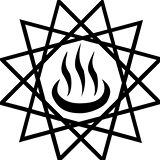(unspecified date in Puanepsion) Parke says that the family holiday of Apaturia had no fixed date because its celebration was not managed by central authorities but by the various phratries (brotherhoods) of Athens, whose male members had all descended from the same common male ancestor. The phratries could hold their Apaturia any time within the month of Pyanepsion.
The festival lasted three days, the first being the Dorpia (Supper Event) where men came from all over Attica to a traditional location for a festive meal. It would have seemed like a family homecoming or reunion. On the second day, the Anarrhysis (Sacrifice, technically the action of drawing back the neck of the victim to cut its throat) took place. And the third day was called Koureotis (Day of Youths or Haircutting), and on this day baby boys who had been born since the previous Apaturia were introduced to and registered into the Phratry. The child would formally appear before the phratry again when he reached adulthood and that might have been when his hair was cut. On both occasions, the father would offer a sacrificial victim to the phratry and, for an adult son, according to the records of one phratry, also flat cakes, a measure of wine and a fee of a silver drachma for the priest. Presumably the meat not going to the priest served as celebratory dinner for the family. Newly married men may also have made a sacrifice at the Apaturia. It is not known whether female children or brides ever attended these events. The presiding deities were Zeus Phratrios and Athena Phratria, but Dionysos also received honors, possibly related to the libations and drinking of wine (resulting in a fourth day of the festival, called Ephibda, “the day after”, like a hangover).
The attraction of this festival for today is that it would be the ideal occasion for a coming-of-age ceremony but also a celebration of recent births, marriages, engagements, graduations and enlistments. In fact, it’s a perfect time for a family reunion organized around family milestones. A coming-of-age ceremony, if taking place, would offer the main ritual for the event, but the get-together would also have a thanks ritual to acknowledge and celebrate all the good moments. The thanks ritual would also include gratitude to the ancestors and, during the meal, family could share stories of their lives.
Sources:
Mour, Jony. “Οι Γιορτές των Αρχαἰων Ελλήνων,” Academia.
https://www.academia.edu/4940897/4957853-Οι-Γιορτές-Των-Αρχαίων-Ελλήνων. Accessed December 3, 2019.
Parke, H. W. Festivals of the Athenians. Cornell University Press, Ithaca, New York, 1977.
